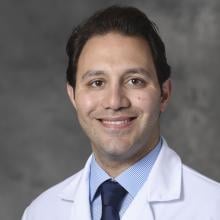As a medical student, do you ever wonder what it’s like to specialize in gastroenterology (GI)? Meet Mazen Elatrache, MD, a gastroenterologist and a featured doctor in the AMA’s “Shadow Me” Specialty Series, which offers advice directly from physicians about life in their specialties. Check out his insights to help determine whether a career in gastroenterology might be a good fit for you.
The AMA Specialty Guide simplifies medical students’ specialty selection process, highlights major specialties, details training information, and provides access to related association information. It is produced by FREIDA™, the AMA Residency & Fellowship Database®.
Learn more with the AMA about the medical specialty of gastroenterology.
“Shadowing” Dr. Mazen Elatrache
Specialty: Advanced therapeutic endoscopy, which is a subspecialty of gastroenterology.
Practice setting: Hospital.
Employment type: Employed by Henry Ford Medical Center in Detroit, Michigan. Henry Ford Health is a member of the AMA Health System Program, which provides enterprise solutions to equip leadership, physicians and care teams with resources to help drive the future of medicine.
Years in practice: Seven.
A typical day and week in my practice: My routine throughout the week consists of around three days of endoscopic procedures, 8 a.m.–5 p.m. and sometimes later until procedures are completed; one day of clinic, 8 a.m.–5 p.m.; and one day of administrative work, from roughly 8 a.m.–4 p.m.
I perform complex advanced and therapeutic endoscopic procedures. I also rotate on the inpatient advanced GI service on average one week out of every six, when we also take a weekend on call. Those weeks are typically busier than the outpatient weeks.
The most challenging and rewarding aspects of gastroenterology: I perform many complex endoscopic procedures, and sometimes their risks of adverse events are higher than standard GI procedures. It is always challenging to balance the risk and benefits of any of these complex procedures and also to minimize risks for any procedure performed.
The combination of the cognitive portion of gastroenterology and its direct application in complex endoscopic procedures is very rewarding, especially when it translates to patient relief after the procedure.
The impact burnout has on gastroenterology: In this subspecialty, we deal with complex diseases and procedures that carry a significant burden of risk and, hence, can result in a great deal of stress. In addition, long endoscopy hours along with use of lead shielding for many procedures can result in increased physical stress on multiple joints. These factors can increase burnout in our field.
How Henry Ford Health is reducing physician burnout: Henry Ford Health is very cautious about burnout in my specialty. We have mandatory online courses that we take to help us recognize signs of burnout. There also are various resources available to help with burnout. In addition, the midweek administrative day is always helpful.
How my lifestyle matches, or differs from, what I had envisioned: Work-life balance is a very important factor in job satisfaction for me. The time that I get to spend with my family and be involved in every aspect of my children’s lives is of great value to me.
Balancing this with work requirements can sometimes be challenging, especially in a procedural specialty. It is very important to acknowledge this limitation and explore various means to be proficient at work. This is not taught in medical school—it only comes with experience.
Skills every physician in training should have for gastroenterology but won’t be tested for on the board exam: There are plenty which come with time, training and mentorship but some include:
- Developing strong leadership skills to manage an endoscopy team during procedures.
- Strong patient communication skills.
- Dexterity and eye-hand coordination for procedures.
- Being able to build a rapport with patients.
- Sound clinical judgement.
One question physicians in training should ask themselves before pursuing gastroenterology: Advanced therapeutic endoscopy is a subspecialty within gastroenterology. If you like combining cognitive medicine with complex procedures, this is a very satisfying field that is primed with constant innovation.
Books, podcasts or other resources every medical student interested in gastroenterology should be reading: From an academic standpoint, Sleisenger and Fordtran’s Gastrointestinal and Liver Disease, by Marvin H. Sleisenger, MD, and John S. Fordtran, MD, is the most comprehensive book for gastroenterology and hepatology and is a great overall guide and reference.
Other books I recommend include:
- Physician: Time to Invest in Yourself: Work-Life Balance, the Needs of the Patient, and Medical-Legal Risk Management, by Timothy E. Paterick, MD, and Elizabeth Ngo, MD.
- The Real Doctor Will See You Shortly: A Physician's First Year, by Matthew McCarthy, MD.
Additional advice I would give to students who are considering gastroenterology: Make sure you are someone who enjoys performing procedures and combining innovation with medicine, but always with the ultimate goal of improving and offering the best care for your patient.




